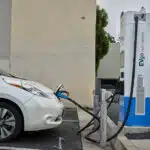The U.S. Treasury Department on Friday, Oct. 6, issued new guidance on how a $7,500 electric vehicle tax credit can be used as a point-of-sale rebate starting in January.
Currently, consumers can only take advantage of the $7,500 new EV credit or $4,000 used EV credit when they file their tax returns the following year.
Starting Jan. 1, consumers can transfer the credits to a car dealer, effectively lowering the vehicle’s purchase price, a change that may help boost EV sales.
Under the guidance issued Friday, consumers will need to attest they meet income limits to qualify for the tax credit or they will need to repay the government when filing their taxes.
For new vehicles, the adjusted gross income limit is $300,000 for married couples and $150,000 for individuals.
Congress approved a sweeping reform of the EV tax credits in August 2022 as part of the $430 billion Inflation Reduction Act (IRA).
Treasury is also releasing more details on registration requirements and the mechanics of the transfer for car dealers.
Dealers will need to register via a new IRS website to offer the credits. Beginning in January, dealers can submit vehicle sales to the IRS and receive payment for tax credits within 72 hours.
Under proposed rules released Friday, credit transfers and advance payments would typically not affect dealers’ tax liability and dealer payments would not be part of a consumer’s gross income.
The 2022 IRA law required vehicles to be assembled in North America to qualify for any tax credits, eliminating nearly 70% of eligible models at the time. On Jan. 1, new price caps on qualifying EVs and the limits on buyers income took effect.
In April, Treasury implemented new rules setting sourcing battery components and critical minerals to qualify.
The Biden administration must still issue rules later this year detailing what constitutes a “Foreign Entity of Concern” that will later disqualify EVs for credits if they have any battery components or if batteries contain critical minerals from a foreign entity of concern.
The Environmental Protection Agency has proposed rules it forecasts will result in 67% of new vehicles being EVs by 2032.
This article was provided by Reuters.







